A Look at the U.S. Financial Regulatory Authority: Safety for U.S. Stock Investors
[DISCLAIMER] This article is for educational and informational purposes only and does not constitute investment advice. Readers should consult with qualified financial professionals before making any investment decisions.
How do you protect US stock investors' money? I'm an independent publisher in finance and IT. I help people understand the financial markets. To invest in U.S. stocks, you need to understand company fundamentals and market trends, as well as financial regulations. These organizations make the market fair and transparent and keep investors' funds safe. Today, I'll show you some of the key U.S. financial regulators and how they protect investors.
Ⅰ. the U.S. Securities and Exchange Commission (SEC)

Background:
The U.S. Securities and Exchange Commission (Securities and Exchange Commission, SEC) was established in 1934 to restore public confidence in the securities market, to prevent fraud and manipulation.
Main Functions:
- Regulating the securities market: SEC is responsible for regulating all securities markets, including stocks, bonds and other financial instruments. It ensures the transparency and fairness of the market and provides a fair trading platform for investors.
- Disclosure Requirements: The SEC requires listed companies and securities issuers to provide periodic financial reports and other important information to ensure that investors have access to accurate and timely information to make informed investment decisions.
- Enforcement Actions: The SEC actively combats securities fraud, insider trading and other violations of the law, and protects the rights and interests of investors through severe penalties.
Ⅱ. the Financial Industry Regulatory Authority (FINRA)

Background: The Financial Industry Regulatory Authority (FINRA) is a self-regulatory organization established in 2007 by the merger of the National Association of Securities Dealers (NASD) and the regulatory arm of the New York Stock Exchange (NYSE).
Main Functions:
- Regulation of Brokerage Firms: FINRA is responsible for overseeing all brokerage firms operating in the U.S. to ensure that they comply with relevant laws and regulations and provide a high standard of service.
- Investor Education: FINRA provides a wealth of educational resources and tools to help investors understand the workings of the financial markets and potential risks, and to enhance their investment skills.
- Arbitration and Mediation: Through arbitration and mediation procedures, FINRA helps resolve disputes between investors and brokerage firms to safeguard the legitimate rights and interests of investors.
Ⅲ. Securities Investor Protection Corporation (SIPC)

Background:
The Securities Investor Protection Corporation (SIPC) was established in 1970 to protect investors' funds from the bankruptcy or financial difficulties of brokerage firms.
Main functions:
- Protection of Funds: In the event of a brokerage firm's bankruptcy, SIPC is responsible for returning up to $500,000 in investor cash and securities, with a $250,000 cash limit. This provides investors with significant financial protection.
- Bankruptcy Liquidation: SIPC participates in the liquidation process of bankrupt brokerage firms to ensure that investors' assets are returned on a priority basis and losses are minimized.
Ⅳ. the Commodity Futures Trading Commission (CFTC)

Background:
The Commodity Futures Trading Commission (CFTC) was established in 1974 to regulate the U.S. futures and options markets.
Main functions:
- Market Regulation: CFTC ensures the transparency and fairness of the futures and options markets and prevents market manipulation and fraud.
- Risk Management: Oversee risk management measures of market participants to ensure the stability of the financial system.
- Enforcement action: CFTC combats illegal trading behavior, protects the interests of market participants, and maintains market order.
Ⅴ. Case Study:

Lehman Brothers Collapse (Lehman Brothers Collapse)
Lehman Brothers, one of the largest investment banks in U.S. history, declared bankruptcy on September 15, 2008, one of the largest bankruptcies in U.S. history.
Background of Events:
The collapse of Lehman Brothers was triggered by the subprime mortgage crisis, in which the firm held large amounts of toxic assets and was unable to find buyers to take over its liabilities, ultimately leading to the firm's bankruptcy. The bankruptcy of Lehman Brothers triggered turmoil in the global financial markets, with many investors fearing for the safety of their money.
SIPC's role:
Immediately after the collapse of Lehman Brothers, SIPC stepped in and initiated a bankruptcy and liquidation process. Through this process, SIPC ensured that investors' securities and cash were safely transferred to other financial institutions. The process was complex and time-consuming, but ultimately ensured that most investors' assets were preserved.
Role of Other Regulators:
The SEC and FINRA also played important roles in this matter.The SEC oversaw the bankruptcy process and ensured that everything was legally compliant, while FINRA helped investors understand their rights and provided relevant educational resources and arbitration services.
Thoughts
In the Lehman Brothers case, I saw the important role that regulators play in times of crisis. It also made me realize how important it is for me, as an investor, to understand the functions and protections of these agencies. Although market risks are inevitable, with the protection of these institutions, our investment path will be more robust.
Ⅵ. To summarize
It's really important to understand these key U.S. financial stock regulators and what they do. It's especially helpful for investors who are investing in U.S. stocks. Take the case of Lehman Brothers, for example. It's a great example of how these regulators protect the interests of investors in the event of a securities firm failure. Even though the market goes up and down and there are financial crises, these regulatory bodies make sure that your money is safe.
If you have any questions or need further guidance, please leave a message in the group and I will do my best to answer them.







